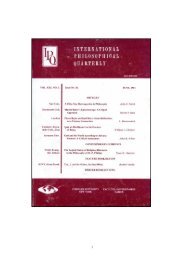The young hegel - Karl Marx Studies
The young hegel - Karl Marx Studies
The young hegel - Karl Marx Studies
You also want an ePaper? Increase the reach of your titles
YUMPU automatically turns print PDFs into web optimized ePapers that Google loves.
eveal how the progressive side to Hegel’s religious writings in the form of nascent dialectics<br />
leads to the social economics and more mature dialectics of the Jena period. Such a<br />
reconciliation of the seemingly dual and antithetical faces of this period beneath the mask of a<br />
progressive rationality demands the skill of a contortionist. Lukacs’ apparent successes<br />
suggest that he had either found his way to the truth or was merely engaged in manipulating<br />
ideas and facts, apeing that master of distortion he admired and served during his life, Joseph<br />
Stalin.<br />
Having inherited a small estate on the death of his father in 1800, Hegel gave up his post as<br />
a private tutor in Frankfurt to work full time on his studies of religion. He went to Jena early<br />
in 1801 at the age of thirty, unknown yet self-assured, spent much of his time there engaged in<br />
an intellectual dialogue with his old friend, Schelling, already famous as a philosopher, and<br />
left after a period of extraordinary productivity, a thinker who had already advanced beyond<br />
his contemporaries in the development of German classical philosophy. <strong>The</strong> Jena period was<br />
probably the most intellectually fertile of Hegel’s life and Lukacs devoted well over half his<br />
book to it, showing how the Hegelian phenomenology of consciousness developed out of<br />
debates and conflicts within German philosophy at that time - initially between Fichte and<br />
Kant, then between Schelling and Fichte and finally between Hegel and Schelling.<br />
On arriving in Jena, Hegel joined Schelling in a vigorous campaign against subjective<br />
idealism on behalf of the new philosophy of objective idealism first expressed by Schelling in<br />
his System of Transcendental Idealism published in 1800. <strong>The</strong> origin of Schelling’s break<br />
with Fichte, Lukacs argues, lies in their different points of departure from the philosophy of<br />
Kant. Fichte, for whom the existence of the world and its content were reduced to the<br />
products of an active Ego, took his point of departure from the Critique of Practical Reason.<br />
Schelling, whom <strong>Marx</strong> had described as a ‘nature enthusiast’ to Feuerbach, accepted the<br />
objectivity of nature as ‘given’ and “began by re-interpreting the Critique of Judgement in the<br />
spirit of objective idealism”. (Lukacs) In an interesting section dealing with this break, Lukacs<br />
implies that Hegel understood the real significance of the divergence between Schelling’s<br />
theory of knowledge and that of Fichte and may well have been instrumental in clarifying it<br />
for his friend. Hegel went to Jena armed with an objective dialectics gained from his last years<br />
in Frankfurt, says Lukacs. This advance, he maintains, enabled him to keep Schelling on the<br />
rails of objective idealism and explains both his immediate substantial polemic against<br />
subjective idealism and the closeness of viewpoint between the two men up to the time that<br />
Schelling left Jena in 1803. This point of view can only be acceptable if one goes along with<br />
Lukacs’ understanding of the Frankfurt period. But let the unwary traveller beware, the ticket<br />
purchased in Frankfurt bears the Lukacs stamp and there is no break in the journey between<br />
that point and <strong>The</strong> Phenomenology of Mind.<br />
Hegel’s criticism of the ethics of Kant and Fichte in his essay Faith and Knowledge and his<br />
support for Schelling’s views in such works as <strong>The</strong> System of Ethics (1801-2) marked the high<br />
point of his own systematic idealism. One of the most interesting and to my mind one of the<br />
most important aspects of Lukacs’ study is his analysis and philosophical overview of Hegel’s<br />
departure from Schelling’s philosophy. He dates the development of this breach from 1803<br />
when Hegel wrote his essay on the Scientific Modes of Treatment of Natural Law and assesses<br />
his intellectual progress by contrasting this work with the earlier System of Ethics. This first<br />
essay is dominated by the question of morality and contains Hegel’s experimental deduction<br />
of economic categories from a universal ‘unity of the people’. <strong>The</strong>se are presented statically<br />
and unhistorically, their contradictions and independent moments being annihilated in a series<br />
of contrived unities. In the essay on Natural Law however, Hegel’s dialectic preserves the<br />
partial moments of its development, in contradistinction to the method of Schelling whose<br />
dialectical annulment ended in an intellectual intuition. <strong>The</strong> great consequence of this<br />
preservation of development and its incorporation into an historical absolute was that it<br />
4




